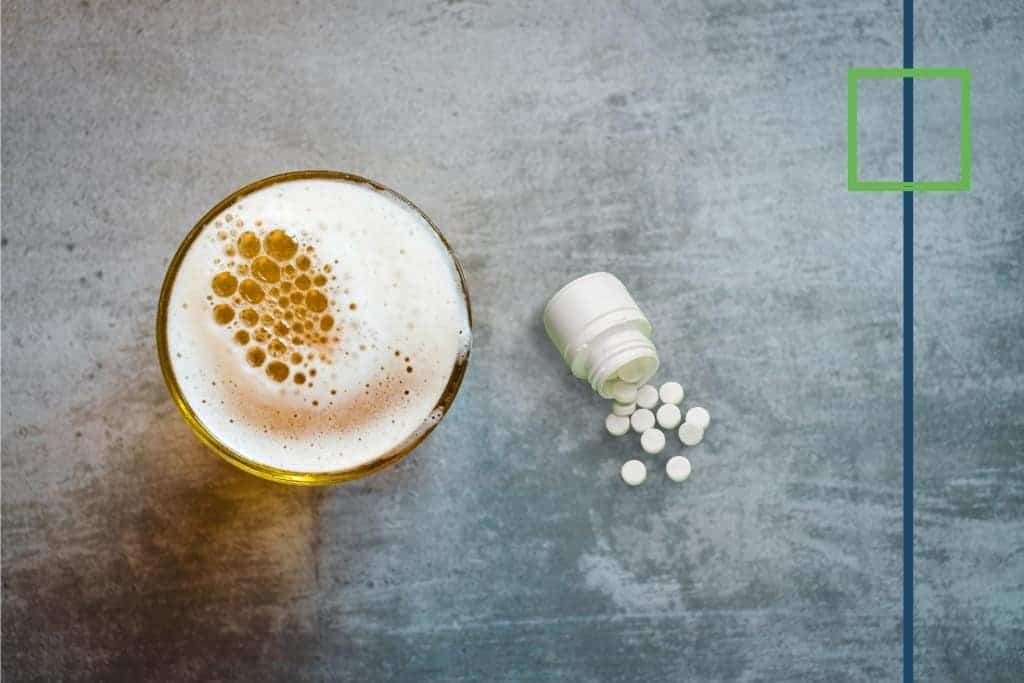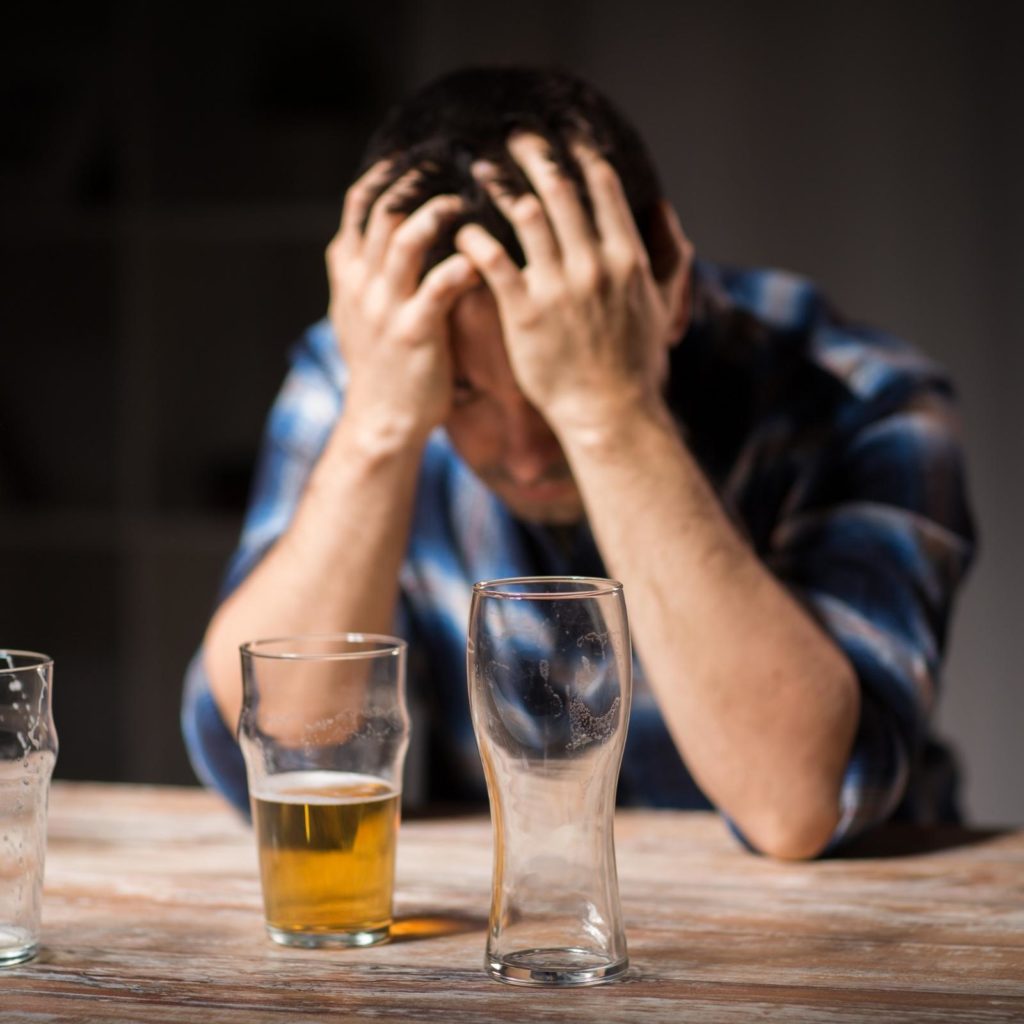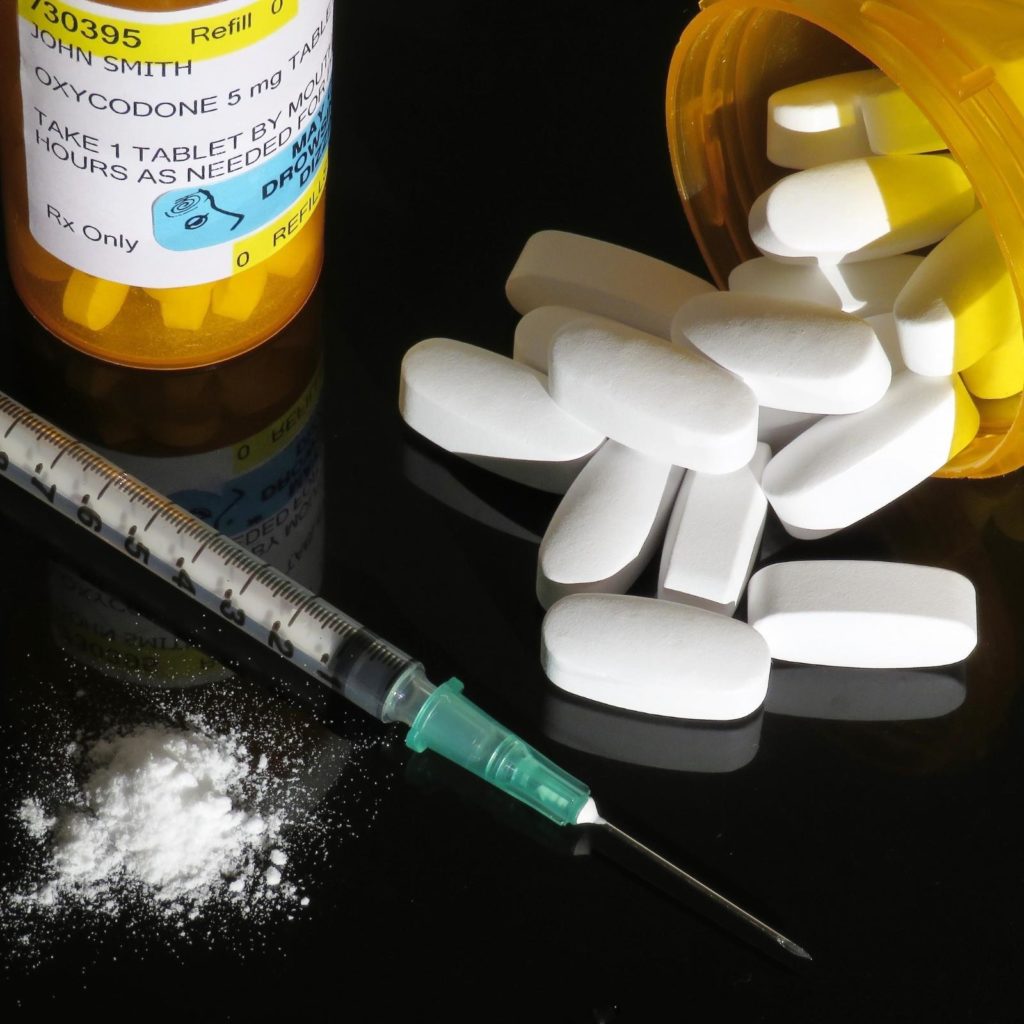How Does Oxycodone Work?
Oxycodone is prescribed for pain relief. Depending on the type of tablet, it can control pain for up to 12 hours as a time-release medication. This means the effects of this medication are released over a longer period rather than all at once.
The potency of oxycodone has been compared to morphine. It works through the central nervous system to alter our response to and perception of pain. In addition to reducing pain, Oxycodone may affect the body in the following ways:
- Slowed heart rate and breathing
- Low blood pressure
- Dizziness
- Nausea
- The increased pressure of fluid in the brain and spine
Because the drug can also cause sensations of pleasure or euphoria, oxycodone is also highly addictive. Regulatory agencies have long been concerned about just how addictive it is. As far back as the 1960s, organizations such as the United Nations Office on Drugs and Crime classified it as a dangerous drug.
How Does Alcohol Work?
Alcohol is not used for medicinal purposes. Individuals consume alcohol primarily for its mood-altering effects. Alcohol works through the central nervous system and depresses or slows the functioning of various parts of the brain.
When you drink alcohol, some is metabolized by your body. If you consume more than your body can process, the extra collection in your blood travels to your brain. Effects of alcohol on the body include:
- Slowed reflexes
- Reduced breathing and heart rate
- Lowered blood pressure
- Impaired ability to make decisions
- Poor coordination and motor skills
- Nausea and vomiting
- Loss of consciousness

Get Your Life Back
Find Hope & Recovery. Get Safe Comfortable Detox, Addiction Rehab & Dual Diagnosis High-Quality Care.
Hotline(844) 597-1011Mixing Oxycodone and Alcohol
Roughly 2 million Americans have struggled with Opioid abuse, with over 100 people dying each day. Additionally, there were a reported 58.8 million Oxycodone prescriptions written in 2013; there is high demand for the prescription Opioid. Such increases in Opioids have stemmed from a combination of prescription Opioids and synthetic Opioids. Some patients who once abused prescription Opioids have transitioned to street-grade Fentanyl, Heroin, and Carfentanil as they have developed a tolerance. Once they become dependent on such Opioids, it is extremely difficult to stop use. Alcohol is also a highly abused substance responsible for claiming the lives of Americans daily.
People can mix alcohol and Oxycodone to intensify the effects of the drug. Furthermore, people may begin using alcohol or Oxycodone independently; if they have a pre-existing use disorder with either substance, this can lead to experimentation. Depending on the frequency of use and side effects this combination produces on the individual, they can continue using this combination until problems occur. Those who combine alcohol and Oxycodone have an increased risk of respiratory depression and an increased risk of fatally overdosing. Individuals can stop breathing due to the effect the 2 drugs have on the body. High blood pressure and even a coma can occur.

Effects of Mixing Oxycodone and Alcohol
Oxycodone also referred to as its brand name OxyContin is an opioid used to treat pain. Similar to other addictive opioids like Heroin, Fentanyl, and Morphine, it is a powerful and addictive substance that has a high potential for abuse. It should be taken as prescribed by a doctor and has side effects that can change based on drugs combined with it. Oxycodone can last up to 12 hours and can function to relieve pain. Those taking it can experience:
- Slowed breathing
- Nausea
- Decreased heart rate
- Fluid in the spine and brain
- Euphoria
- Constipation
- Vision problems
- Dizziness
Not unlike the use of other opioids involved in the opioid crisis, individuals who take Oxycodone can become addicted and choose to feed their addiction with more potent substances. In many cases, those battling an opioid use disorder who develop a tolerance or dependence are at risk of developing addictions due to the drug’s ability to relax the central nervous system. Lastly, Oxycodone can often be made available for use with Percocet; this can create a highly addictive combination.
Alcohol works to depress the nervous system, producing calming effects for some. In addition to the effects that alcohol produces, like slow reflexes, nausea, and poor coordination, those drinking alcohol with Opioids can become addicted to the feeling the combination produces. Lastly, those who combine alcohol and Oxycodone and are older have a higher risk of respiratory depression.
Are you or somebody you know at serious risk of an overdose because of drug or alcohol abuse? If so, please call 911 right away. There are addiction rehab center addiction hotlines that can help guide you to proper local therapists & facilities.
SAMHSA TREATMENT HELPLINE
Struggling with substance use disorder? SAMHSA’s Addiction Treatment Helpline can connect you with proper help. (844) 597-1011
DRUG or ALCOHOL POISON CONTROL
If you’re experiencing or witnessing a drug- or alcohol-related poisoning, the poison control hotline can help. (844) 597-1011
How does Oxycodone React With Alcohol?
Substance abuse, including opioids and alcohol, continues to be a health concern in the United States. Addressing addiction and opioids is listed as one of the U.S. Surgeon General’s top priorities.
Approximately 88,000 people die from alcohol-related causes each year, according to the National Institute on Alcohol Abuse and Alcoholism (NIAAA). About 130 people in the United States die each day from overdosing on opioid drugs, according to the National Institute on Drug Abuse (NIDA).
- Alcohol was involved in 22 percent of deaths and 18 percent of emergency room visits that involved misuse of prescription opioids in 2010, according to the Centers for Disease Control and Prevention (CDC).

Over 50 percent of teens who misuse opioids reported combining opioids and alcohol during one year, according to NIDA.
According to a recent study in the journal, Anesthesiology, combining alcohol with oxycodone led to a significant increase in the number of times participants experienced a temporary stop in breathing. This effect was particularly pronounced in elderly participants.
Alcohol and Oxycodone Withdrawal Effects
Symptoms Of Oxycodone Withdrawal
Withdrawals occur when someone continuously abuses a chemical, becomes addicted, and then stops. The individual will feel the effects of dependence if they stop using it. In the case of Opioids, someone can experience the following symptoms that include but are not limited to:
- Cravings
- Sweating
- Nausea
- Mood swings
- Anxiety
- Depression
- Vomiting
- Diarrhea
- Panic attacks
The symptoms of withdrawal vary depending on the severity of the addiction. The first 6 to 30 hours can produce feelings of tiredness, sweating, and anxiety; at 72 hours some can experience vomiting, chills, and diarrhea. Combining opioids with alcohol makes someone more vulnerable to alcohol withdrawal as well as Opioid withdrawal symptoms. Some of the most commonly reported side effects include but are not limited to:
- Mood swings
- Delirium Tremens
- Depression
- Confusion
- High blood pressure
- Seizures
The Effects Of Alcohol Withdrawal
In addition to these symptoms, someone may find it hard to stop abusing this deadly combination in an attempt to feel normal. The help of a qualified medical professional could provide the needed support through detox and 24-hour monitored care, getting those in need on track to recovery.
Can Alcohol and Oxycodone Kill You?
The most significant danger of mixing these drugs is an increased risk for overdose or alcohol poisoning. The combination can quickly lead to death if you drink too much while taking any amount of this pain medication. In addition, people who use both substances regularly may build up a tolerance as their bodies get used to higher doses. This can increase the risk of overdose.
It’s also important to know that some overdose medications like Naloxone (Narcan) will not work correctly when mixed with alcohol. This can lead to delayed treatment during emergencies that involve overdose.
Alcohol and Oxycodone Overdose
One of the most important things for you to be aware of is that an overdose occurs when your breathing and heart rate slows down too much, leading to death if not treated quickly. Some signs of this happening include:
- Slowed or stopped breathing, shallow breathing, tiny breaths
- Tiny pupils (the black hole in the middle part of your eye)
- Blue skin around lips or fingernails
If you see these symptoms, call 911 immediately. It’s better to take action right away rather than risk waiting until it is too late. While overdoses are scary events, there are several ways to treat them. One treatment is naloxone (Narcan), which can reverse the effects of opioids like OxyContin. This medication can quickly reduce respiratory depression and help get someone back on track toward recovery. More severe overdoses will require additional medical attention to prevent any long-term complications.
Get Help. Get Better. Get Your Life Back.
Searching for Accredited Drug and Alcohol Rehab Centers Near You?
Even if you have failed previously and relapsed, or are in the middle of a difficult crisis, we stand ready to support you. Our trusted behavioral health specialists will not give up on you. When you feel ready or just want someone to speak to about therapy alternatives to change your life call us. Even if we cannot assist you, we will lead you to wherever you can get support. There is no obligation. Call our hotline today.
(844) 597-1011What is Polysubstance Abuse?
Polysubstance abuse involves the consumption of more than one drug at once. Although polysubstance misuse often refers to the misuse of multiple illicit drugs, it’s also inclusive of prescription medications used in nonmedical circumstances. Polysubstance misuse may also be referred to as polysubstance abuse and polysubstance addiction
In some instances, those on prescription medication may unintentionally combine substances. They may have a few glasses of wine without realizing that their prescription medication should not be mixed with alcohol, or they may be on multiple prescriptions from different doctors, not realizing that these medications interact negatively with one another. As a result, individuals should always inform every doctor of every medication they are taking and confirm that medications don’t interact negatively with each other or alcohol before beginning a new prescription.

Other people intentionally engage in polysubstance misuse to experience greater effects from multiple substances. Oftentimes, users may have a preferred substance of misuse that they then combine with other substances at times to enhance the primary substance’s effects. For example, those who regularly misuse opioid drugs, like heroin or prescription painkillers, may sometimes take them with benzodiazepines to experience even greater relaxation or sedative effects.
While the combination of certain substances can certainly enhance desired effects of the drugs, polysubstance misuse also enhances the potential negative effects of each drug.
According to the University of Michigan, mixing drugs can also bring unpredictable consequences; this means that those who engage in polysubstance misuse cannot predict the array and severity of negative consequences that could result.
World-class, Accredited, 5-Star Reviewed, Effective Addiction & Mental Health Programs. Complete Behavioral Health Inpatient Rehab, Detox plus Co-occuring Disorders Therapy.
CALL(844) 597-1011End the Addiction Pain. End the Emotional Rollercoaster. Get Your Life Back. Start Drug, Alcohol & Dual Diagnosis Mental Health Treatment Now. Get Free No-obligation Guidance by Substance Abuse Specialists Who Understand Addiction & Mental Health Recovery & Know How to Help.
Polysubstance Abuse Treatment
Since withdrawal from multiple substances is more complicated than withdrawal from one substance, inpatient medical detox is generally recommended.
With medical detox, clients are supervised 24 hours per day by medical professionals. This ensures continuous monitoring of vital signs, and prompt action should any medical emergencies occur. In addition, supervising physicians often administer medications to counteract certain withdrawal symptoms, such as anti-nausea medications to deal with vomiting and intestinal upset or antidepressants to address mood fluctuations.
In certain instances of substance misuse, long-term maintenance medications may be administered. For example, if a person was regularly abusing prescription painkillers like Vicodin and cocaine, medical staff may administer an opioid replacement medication, such as methadone or buprenorphine, to mitigate the severity of opioid withdrawal.
Since cocaine withdrawal symptoms don’t tend to be as intense, the symptoms of cocaine withdrawal may simply be monitored and medicated as needed. In other instances, such as with benzodiazepine withdrawal, a tapering approach may be implemented, in which the dosage of a long-acting benzodiazepine may be slowly lowered over time, gradually easing the client off the drug to lessen the severity of withdrawal.
Due to the potential unpredictability of withdrawal from multiple substances, continual medical monitoring is always needed. In addition, the support and encouragement available in medical detox decreases the likelihood of relapse and increases the chances of successful withdrawal from all substances of misuse.
Reclaim Your Life From Alcohol and Oxycodone
Mixing alcohol and oxycodone is one of the more common forms of polydrug abuse. We Level Up rehab treatment & detox center can provide you, or someone you love, the tools to recover from addiction with professional and safe treatment. Feel free to call us to speak with one of our counselors. We can inform you about this condition by giving you relevant information. Our specialists know what you are going through. Please know that each call is private and confidential.
Experience Transformative Recovery at We Level Up Treatment Centers.
See our authentic success stories. Get inspired. Get the help you deserve.
Start a New Life
Begin with a free call to an addiction & behavioral health treatment advisor. Learn more about our dual-diagnosis programs. The We Level Up Treatment Center Network delivers recovery programs that vary by each treatment facility. Call to learn more.
- Personalized Care
- Caring Accountable Staff
- World-class Amenities
- Licensed & Accredited
- Renowned w/ 100s 5-Star Reviews
We’ll Call You
Sources
[1] 10 questions to ask addiction therapists. (n.d.).
alcoholtreatment.niaaa.nih.gov/how-to-find-alcohol-treatment/10-questions-for-addiction-therapists#topic-can-you-treat-more-other-issues-beyond-aud
[2] Alcohol. (n.d.).
drugscience.org.uk/drugs/depressants/alcohol
[3] Alcohol facts and statistics. (2018).
niaaa.nih.gov/alcohol-health/overview-alcohol-consumption/alcohol-facts-and-statistics
[4] Alcohol screening and brief intervention for people who consume alcohol and use opioids. (2018).
cdc.gov/drugoverdose/pdf/prescribing/AlcoholToolFactSheet-508.pdf


